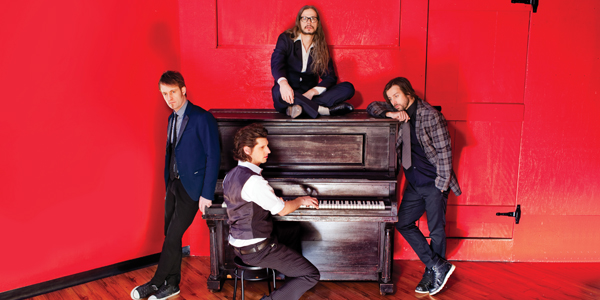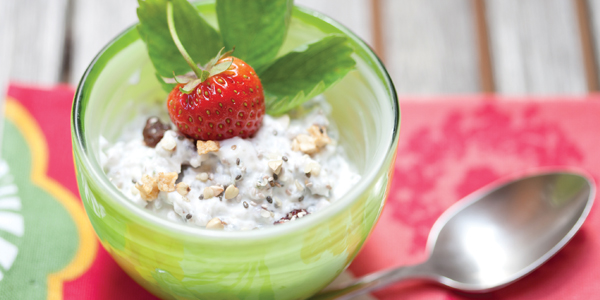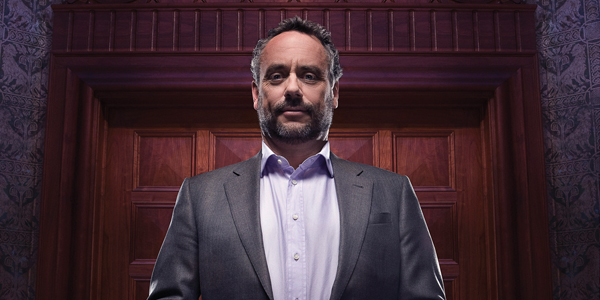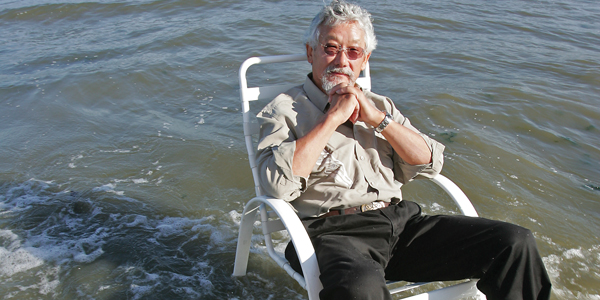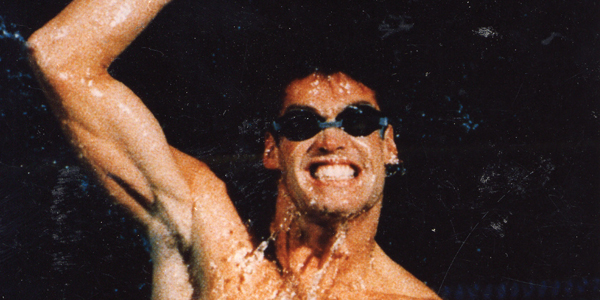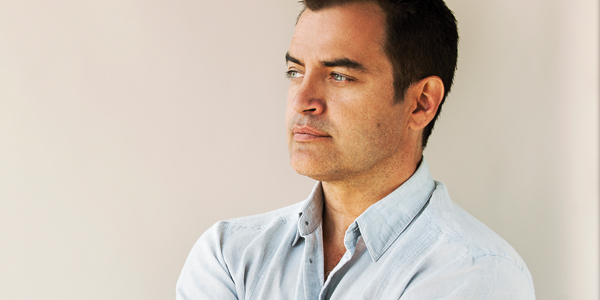After two decades leading the unrivalled band Our Lady Peace, Raine Maida proves that no battle is too long if you stay true to your passion
For the past twenty years, Raine Maida has been the front man of Our Lady Peace (OLP), one of the biggest, bestselling bands in the country. He and his bandmates have sold millions of records worldwide, won four Juno Awards and captured ten MuchMusic Video Awards, one of the most MMVD’s ever awarded to any artist or group.
I remember where I was the first time I heard Maida belt out the powerful lyrics to, “Somewhere Out There.” I was driving with my then one-year-old son, Colton, who was fastened in his car seat behind me. I reached for the dial, turned up the radio, and we both listened, completely absorbed. Although I can’t speak for Colton, I remember losing myself in the song. It had so much power and emotion, and when Maida continued to sing from a “pure” and passionate place as he so often does with his lyrics, the impact seemed to intensify.
As destiny would have it, ten years later, I’m meeting Maida and the oldest of his three sons, eight-year-old Rowan, in a coffee shop in Toronto. When he and his smaller companion first approach my table, his arm extends, and I’m greeted with a firm handshake and a warm smile. In a deep, sultry voice, he offers a sincere apology for running late – a perfect gentleman.
Later, as we’re wrapping up the interview, Maida’s equally famous wife, Chantal Kreviazuk and son’s Lucca and Sal (Salvador) walk in and join our table. I quickly witness his devotion to his family, and the very natural, close bond they share. Maida’s life exemplifies a balance of family commitment, and uncommon desire to grow and improve while giving back.
Days earlier before our encounter, the superstar couple were honoured with the Allan Slaight Spirit Humanitarian Award, in recognition of their long-standing tireless commitment to numerous philanthropic initiatives. Among the many charitable organizations they support, Maida along with his wife have dedicated themselves to War Child, an organization that aids at-risk youth in war-torn countries.
In 2000, the benevolent couple travelled to Iraq to provide humanitarian assistance to Iraqi children following the war. “If you think about their future, these children are handcuffed,” shares Maida, referring to the effects of the sanctions on the children, especially in terms of health care and education. Their efforts during this trip were made into the documentary, “Musicians in the War Zone”, an eye-opening call to action for youth to become educated, responsible global citizens.
But this socially conscious, slightly introverted, self-assured man has many sides to him. Maida can also command centre stage in front of thousands of screaming fans, write songs with major recording artists like Avril Lavigne, David Cook, and Kelly Clarkson, produce tracks for emerging artists, achieve a black belt in karate, and be a dedicated husband and hands-on dad to his three sons, all while being committed to giving his best effort at everything he does. Even OLP’s most recent album “Curve”, released in April personifies his intention. A vintage picture of heavyweight boxing legend George Chuvalo graces the cover – the 74-year-old is recognized for his fighting spirit. As a boxer, Chuvalo was never knocked down in 93 professional fights, and he fought the best, including Muhammad Ali, twice – both times Chuvalo went the distance causing Ali to call him, “the toughest guy I ever fought.” Outside of the ring, he lost a son and wife to suicide, and two sons to drug overdoses, before he founded George Chuvalo Fight Against Drugs, to support his unwavering dedication to the prevention of drug abuse. Maida was inspired by Chuvalo’s strength both in and out of the ring, and felt he seemed to mirror the general theme of the record, which is perseverance in the face of adversity. “There’s something romantic about being beaten up and able to get up, dust yourself off and get back in the ring,” says Maida about “Curve”. “This is the closest we’ve come to creating music with the purity and boldness that only exists before you decide to do it for a living.”
Many bands would love to have the chance to control their musical careers like OLP has. “Curve”, an album that has been in the works for many years, is reflective of the band staying true to music that challenges and pushes them as artists. “In a sense, this is our boxing record,” explains Maida, “it’s a metaphor for the ‘battle’ to come up with something more authentic and inspiring.”
“Curve” debuted in the Top 10 in Canadian album sales. The album’s first single, “Heavyweight” is currently charted at #1 on Canada’s Mainstream Rock radio airplay chart. It looks like another “win” for OLP and Maida’s fight to stay relevant and real are even more revealing as we sit down to chat with him about his successes, his inspirations and the challenges that lie ahead.
Congratulations on your Allan Slaight Spirit Award. What an incredible honour for you and Chantal, and well deserved I might add.
Thank you. It’s quite humbling. Any of the people that I’ve become familiar with in the charitable world that have given me a source of conscience, I feel like I take way more from them; more than I give back. I just try to make that clear because I don’t want people thinking I have delusions of greatness.
I notice a lot of your chosen charities are child-driven. Did you decide to get involved since you’ve become a father?
No. Not really. I’ve always had a connection to youth. War Child is obviously youth-driven but they’re music-oriented as well, which helped as far as the fit. If you visit War Child’s office in the summer, it’s just full of kids that are interning from all over the country.
For me, it really comes down to energizing our youth in positive ways. If you look at this world, it’s that younger generation that’s really going to make change, so I believe it starts from the bottom up.
If we can teach these guys (motions to his son) to be more accountable, responsible and to feel connected – that we’re all connected – that’s really my goal. It just transcends into youth very naturally for me.
Do you involve your sons?
We do. For Rowan’s birthday we said no gifts this year, but instead you can go on War Child’s website and donate. So they can see where that money goes. Rowan follows it, too. And they can watch schools being rebuilt on the site.
[Raine asks Rowan] You like that right, you appreciate that? And understand it?
[Rowan] Yes.
That’s great to teach them at a young age what that feels like. The gift of giving!
Exactly. And it’s happening with them on many levels. Their school is very community-oriented – it’s the biggest diversity school in Los Angeles. They are minorities in their class and even just that alone, being connected to so many cultures, and not knowing any different. I think that’s really the key
If you don’t have to teach them about it and it’s just a part of their lives, it’s so much easier.
To me, that’s the true value and the purity of those types of relationships. When they take it for granted, because it’s a part of their experience, they’re immersed in different traditions and foods, backgrounds, customs, beliefs, and it’s really incredible to see it on this level. Witnessing it, you really internalize how great it would be if we could get there, globally. I think respect is a monumental word and is something that’s inherent and ingrained. If we can create a new generation that is more understanding, more engaged and educated about the importance of respecting each other and our differences, we’ll be so much better off.
I agree. And I love that you mentioned respect. Being true to yourself and respecting that right in others is a great thing to teach our children. So often we see kids conforming and trying to fit in at the expense of losing what makes them unique and special. Or even sacrificing what makes them happy. You studied criminology at the University of Toronto, which is a very different path from where you ended up.
Well, I don’t know. There are a lot of criminals in the music business. (Laughter)
(Laughter) So when did you get the music bug? How did you know you needed to make the change?
While I was studying, I saw a “musicians wanted” ad in a magazine and I responded. That single decision changed my career path. Music has been a passion of mine before I even knew why. It’s a form of creative writing for me. I remember in Grade 3, I loved writing poems and it really came down to, “How do I get people to hear my words?” I don’t want to say poetry is dismissed but in terms of the artistic totem pole, poetry is pretty far down.
Music to me was like poetry and I thought this would be a great way to express myself and get my words out.
I joined a band when I was fourteen, and some of the records that I really fell in love with were from [Peter] Gabriel, U2, R.E.M., Neil Young – very political. So then it added this other component to what music could be and that was very attractive to me. And from there, I became a bit of a sponge trying to absorb as much as possible. I joined Greenpeace and Amnesty, and then education became a big factor behind what I write. It was a very natural art for me to express myself and my views.
You clearly like to grow and feel challenged. And you’ve been with your band for twenty years now. How do you continue to keep that fresh and move beyond what you’ve already done?
As an artist, we wear many different hats, so the variety keeps me inspired. Chantal and I write a lot of songs for other people, and take part in events (like the Junos Live Music Labs this spring). This kind of opportunity, for me, is about trying to help younger artists realize that, especially these days, if you want to be in this business, you had better be authentic. If you’re doing it for other reasons, and you can imagine what celebrity culture has done for kids, if those are the reasons, don’t do it. If you have conditions of being a rock star and being rich, living the lifestyle that’s been presented before; it’s just not there anymore. Maybe ten years ago you could balance that but not anymore. It’s done. The music industry has collapsed to the point where, really, what’s going to survive is the genuine, real deal.
And do you feel you’ve been genuine all the way through?
Yes. I mean we were on a major label – Columbia Records in New York – so there was always a struggle but for the first few records it [the label] was OK. And then as the business started to conglomerate, and radio got bought out by Clear Channel and Live Nation came in, it just got smaller and smaller. Then with the profit margin collapsing things just got more desperate on the major label. They just wanted “hits” – it became a bit of a struggle in terms of what they expected from us and what we wanted to do musically. For us, it’s always been about trying to push ourselves, our boundaries. With our new record we own it, so we were able to artistically make a statement again, which we are really proud of. But I’m not bitter about any of it – it’s all a part of the journey. I think if we weren’t together as a band or I wasn’t in music anymore, I’d have a different view but we made it through and we’re on the other side. We have ownership back again and that’s such a key thing in life. Whether it’s owning what you do as a job or the way you raise your kids or your relationship with your spouse – accountability and responsibility are key – and this is new territory for me. Having kids has changed the way I make music. I think my biggest realization – my epiphany – is that no matter what I preach to my boys about what I believe – right and wrong, values and character – they’re going to sit with my music at some point and get to know me more through it, more than anything else.
Because you write from a soulful place?
Yah, and it’s interpreted. And they can really see what the difference is between their perceptions of me as their dad compared to an artist. I say a lot more in my music than I’ll say to them right now. Right now I just give them little seeds, but when they can understand my music, that’s the full scope of who I am. And I love that responsibility now. I wish I would have had that earlier.
On the topic of responsibility and the impact lyrics and music can have on people’s lives, I know many people have shared with me that music has helped them through a tough time. One person once told me it saved his life. I know for me personally, it can influence how I’m feeling. Do you ever think about that when you’re writing? Or write with that perspective in mind?
No, and we [the band] get that all the time – people coming up to us and sharing personal stories about how our music has helped them through hard times. It’s humbling but the only way for me to accept that, is to acknowledge that music did that for me. I remember when I was sent to a private high school for a couple years and I had a really rough time – I didn’t like it there – and I remember listening to “The Joshua Tree,” “Unforgettable Fire” and records like that and falling asleep to them. That escapism and those types of bands and that type of music was my religion. It just felt like there was safety in it and I love all the things that music can do for you. So when someone says that to me, I get it on that level. And I don’t think any of the bands I listened to set out to do that either. As an artist, when you write there’s just something you connect to and because of that connection, you want to share it. For me it’s about finding something that personally moves me. You can’t control and even predict how people will respond or how it will personally impact them. That’s why I don’t think about it.
You’ve achieved a level of success that so many of us dream of, and I’m sure the climb has had really challenging moments. What has been your greatest lesson along the way?
I don’t know. From a success perspective, I don’t think it’s over; the opposite actually – I feel like it’s only just begun. I’m finally learning now what success is really all about. One of my greatest lessons came from a friend of mine from Rhode Island. He is a total activist in the way he lives his life – it’s what most would aspire to when you talk about being green, eating right, living an inspired life, having a positive say and a voice.
And there was something he once said to me that no one has ever said to me before. And it stuck. It was about “celebrating the small victories.”
I think we get so goal-oriented about the big things we want to achieve that we miss the important stuff along the way. And that’s only been three years in the making for me – trying to celebrate the small things but what I’ve noticed is they’re the building blocks for everything else. Because if you’re always looking too far ahead, then you just miss it all – you miss what really matters. Like my son, sitting in on his first interview, listening to us right now – that’s pretty incredible. We’re talking about important stuff. He’s learning about my life and my work.
Well I’m glad you could join us Rowan. Are you having fun?
[Rowan] Yes. (smiling)
When you think about your legacy or how you want to be remembered, what comes to mind? What’s most important to you?
These guys (motions to Rowan). I mean family. Chantal and I work really hard at our relationship – how we act and hold ourselves obviously transfers down to them. And we’re just learning that. It’s work. It’s all work.
Too many people go through life not realizing that everything is work.
And I think when you truly understand that, and that a relationship is work on a very high level, then everything else is so much easier. It’s pretty basic: Your kids see everything, so everything you do is being observed and that’s been a bit of a wake-up call for Chantal and I. But I’m proud to say we’re doing the work and that’s an amazing feeling. It’s actually the effort, and even the struggles that you go through, that make you feel fully alive. I’m at a place now where I really understand that you’ve got to grab onto life. So often it feels like you’re getting ready to live, like as soon as you do this or that then you’re living. When I think about War Child, it definitely gives me perspective; makes me realize you’ve got to go for it while you’re alive.
Absolutely.
Otherwise you might as well take a pill and just float through life. And where is the reward in that?
You seem very grounded – in who you are and what you want. And I get the impression that your professional success hasn’t defined who you are – you’ve managed to stay independent of your fame. Have you always been strong and centred that way? Or is there someone who influenced this in you?
Yes, my parents. My mother was born in Canada and my father was born in Italy. My father came here when he was six-years-old, he had five siblings and his family had nothing. They had a tiny little house and a store in the bottom and whatever food they didn’t sell that day is what they had for dinner. My dad then started working in construction and finally built a company himself. And there was good and bad with that. He was busy so he wasn’t around much – he’d be gone at 8:00am and get home at 9:00pm. And on the weekends if I wanted to spend time with him, I would have to go hang around the job sites. But what that did for me was build my work ethic – a drive and determination that’s in my pores. And I think that’s so important, especially now because everyone feels so entitled these days. My mom was the same way, too. They got divorced when I was young and she worked just as hard as my dad. When you have that instilled in you, you’re not lazy, and you don’t feel things should be given to you. You know it takes work. I had very humble beginnings yet my parents could afford to send me to a private school for two years. And then there was a year that I couldn’t go because it was a tough year in the housing business. And that’s life. I got to personally experience that you can’t expect things to be handed to you. Sometimes your situation can change – and it’s not by your doing, it’s complete circumstance, it’s not something you can control. So enjoy what you have in this moment. It’s one of those life lessons that I’m so thankful for because I remain humble and grateful for what I have. I don’t take things for granted. Ever.

